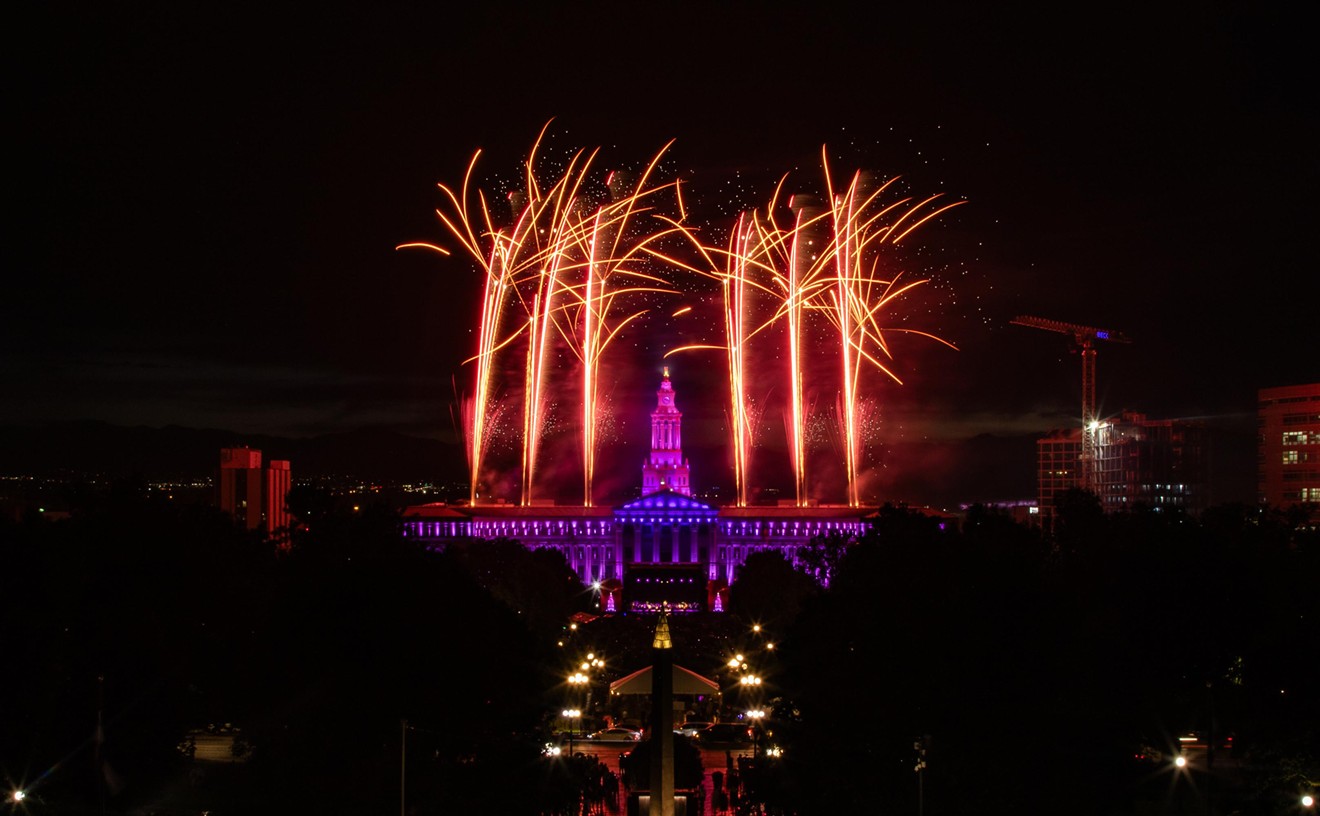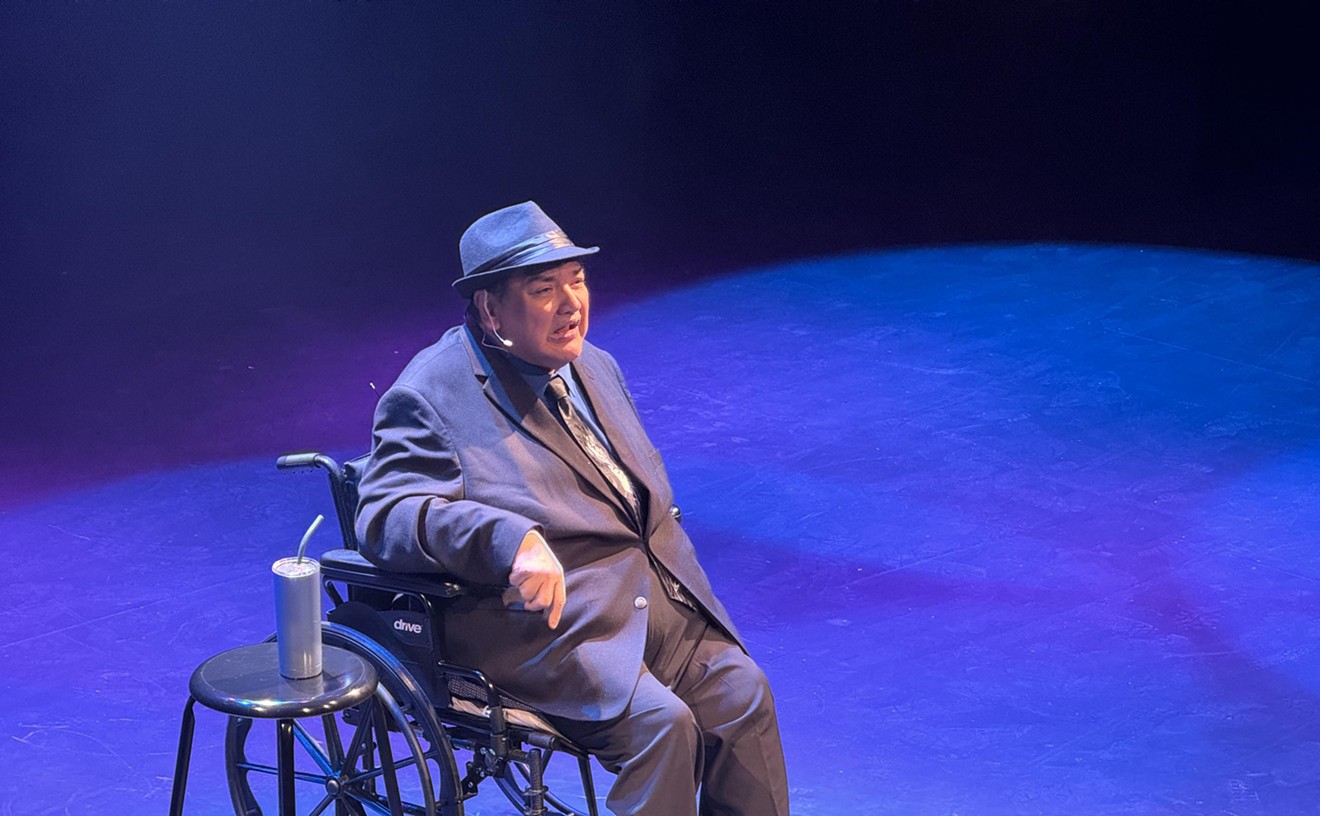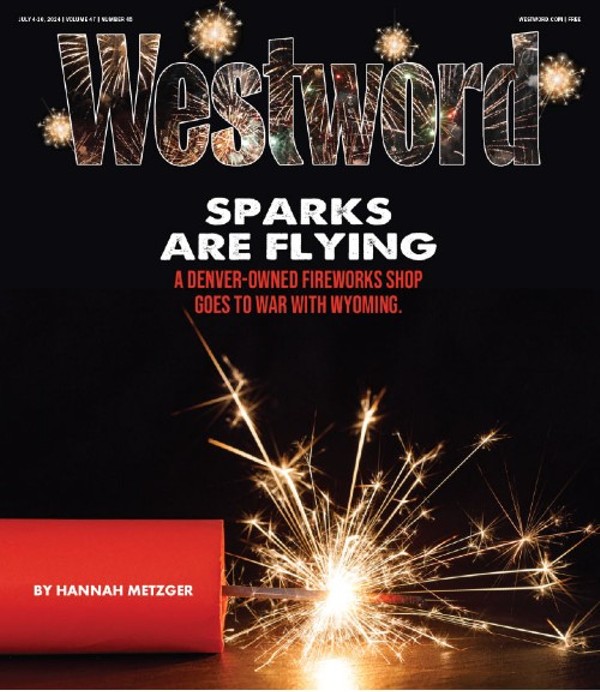If there's any winner in the Women of the World Poetry Slam, it's Denver, first figuratively and now literally. The international championship, in its fifth year and Denver's first as the host city, kicked off Thursday and held its second preliminary round on Friday before ending with two X chromosomes and one winner Saturday night at the Denver Art Museum.
After four days of competition, Denver's own Dominique Ashaheed took home the title.
Can we say poetic justice?
This is not Ashaheed's first rodeo. The poet already holds another national championship title for her role on Denver's 2011 Slam Nuba roster. Women of the World, which places Denver in the running to host future and larger slam gigs, is now the city's second concurrent national title. But after maintaining the highest overall rank through both preliminary rounds, it seems the only person who is surprised by Ashaheed's final victory is the poet herself.
Two days after her international win, Ashaheed has yet to recover from the final round, in part because she still hasn't adjusted to Slam Nuba's national win in August. It was never her intention to compete in WOW this year, in large part because of the stress and anxiety that comes with it, but as Nuba's only female member, it was her responsibility to represent the team.
"I have to be really honest with you: I'm still feeling really disembodied from it all," Ashaheed admits. "The first night was honestly just about trying to power through it, trying to ignore the fact that I'm on the same stage as women like (2009 WOW winner) Rachel McKibbens and (2011 winner) Theresa Davis, all these women I have huge respect and all these powerful feelings for. It was otherworldly."The 37-year-old poet is a mother of three sons and a daughter, children who range in age from three to thirteen and provide fodder for both her poetry and perspective. As she progressed through the competition over the past few days, Ashaheed continued to surprise herself through her interactions onstage and with her two coaches, Jen Rinaldi and Ayinde Russell. Although her original motivation was simply to "push through" to the end, the Denver poets worked with her on a change in strategy she was loathe to undergo: "They both suggested that instead of powering through it with this politically active, aggressive, throw-your-black-fist-in-the-air vibe, I [instead] tap into this shadowy, vulnerable area of myself that I didn't know I was ready to let out so completely. It was difficult."
Through early poems dedicated to police brutality and a childhood crush, Ashaheed prepared to peel back what she calls, her voice choking up, a "huge emotional layer." Each round became a progression into her vulnerability so that the second night, after realizing she would stand on the finals stage at the Denver Art Museum's Ponti Hall the next day, Ashaheed wept. By then, she knew exactly which three poems she would perform her last night -- and in what order. The structure was dictated by necessity: By the third poem, she would not be able to continue.
Click through for the rest of Ashaheed's story and additional video of the final night.
On Saturday night, Ashaheed turned to "Karma" to begin her final appearance. The poem covers her struggle with the tragedy she witnesses regularly on the evening news and the realization that, despite her interpretation of it through poetry, she is incapable of preventing any of it. For the evening, Ashaheed made it her goal to travel through three states of expression: first anger and outrage, then sadness and confusion until finally, searching for an epiphany, she intended to empty herself onstage. Her next poem, "Stargazer," played the central role, letting the audience in on the moment she lost her virginity.
Because the choice, she points out, was hers.
"During this competition, I heard many women speak about rape, about molestation, about abuse from men, but I didn't hear anyone speak out about afterward, about the reclamation of their body and spirit," Ashaheed says. "It was a critical venture in claiming my body for myself because I had been molested as a child. I walked around the planet for a long time feeling broken and thinking there'd be no hallelujah for me. When the moment is over, when he's asleep afterward, he has no idea what this moment meant to me, but now an entire audience does."
In the end, it was Ashaheed's final poem that became the most significant moment of her 2012 WOW experience. The inspiration for it was a long time in coming: Although written relatively recently, "For Emmett Till" tackles the death of the African-American fourteen-year-old in 1955 after he was believed to have flirted with a white woman. But like most of her poems, the surface level is only the introduction.
As a child, Ashaheed's mother discovered Till's story inside a copy of Jet magazine her grandmother strategically placed on the living room coffee table. The truth was traumatic, and it became a strange tradition. "Years later, I found myself watching a documentary dealing with the same topics when my thirteen-year-old song came in, happy and unaware, and asked what I was watching," Ashaheed says. So she invited him to watch, and Saturday she referenced him inside the poem that resulted. "I knew I was traumatizing him to protect him, that I was doing the same thing my grandmother did. When it was over, he had no language to give it at all."
Ashaheed's eventual win came with a margin of only .1 point over second-place poet Porsha Olayiwola, the partial result of a time penalty she incurred during "For Emmett Till." While she practiced the poem earlier in the evening, Russell and Rinaldi clocked her performance at five minutes and twenty seconds, significantly over the limit. But even after cutting large sections out of the poem to take it down to size, Ashaheed found herself reciting some of the abandoned portions from memory during the finals.
"I saw the hands going up, and I didn't care," she says. "I didn't care about any of it because I knew I was going to get an opportunity to perform that poem, and I was speaking about my family, my legacy and the struggles of the world at that precise moment."
Ashaheed also earned the night's first perfect 10 score for her shortened rendition of "For Emmett Till," available in various video forms online. After the 72 participants were whittled down to twelve, Kait Rokowski took third while Joanna Hoffman took the fourth place spot. While she continues to contemplate the victory's effects on her own life, Ashaheed sees the title -- and the gig behind it -- as a broker of change in Denver's slam future."I think it's important because we did it well," she says. Right now, the city's poetry powers that be continue to contemplate entering a bid to host the national championship. "Tons of people told me it was the best WOW they had seen yet, the best finals stage the competition has ever had. I continue to be shocked when people are surprised at Denver's success."
In the meantime, the experience reinforced Ashaaheed's need to abandon her internal narrative, the one that tells her, periodically, that she is not enough. The one that would be wrong. "I'm learning to let that go, to realize it's just a tape in my head," Ashaheed says. "In the end, I didn't keep anything for myself. I emptied myself on that stage, and I have nothing left."
To relive the final rounds, you can stream the entire thing on the WOWPS Ustream channel or watch it below:











